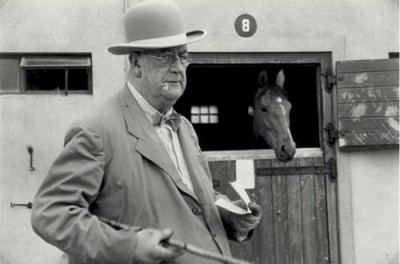The father of photojournalism, Henri Cartier-Bresson is not as well known for his films as he is for his photographs. Known for his unromantic portraits of urban life and coverage of war-torn corners of the world, the co-founder of the international cooperative Magnum Photos and author of the book known in English as The Decisive Moment was also a documentarian. (He also served as second assistant director to Jean Renoir on two films, one of which was The Rules of the Game, in which he also acted!) This two-disc set from New Video thoughtfully compiles all of Cartier-Bresson's films, as well as a collection of short subjects about the man and his art.
Disc 1: In his sideline as filmmaker, Cartier-Bresson made two documentaries about the Spanish Civil War, one about prisoners of war returning home after World War II, and, much later, two short television documentaries in the United States. These five films are all included on the first of the two discs in this set.
Victory of Life (1937, 46:53) is very much a pro-Republican propaganda piece documenting the conditions on the ground in Madrid during the Spanish Civil War, for citizens and soldiers alike. It's an effective film assisted by the immediacy of the footage, much of which was shot on the front lines, and edited with a strong narrative sense.
Spain Will Live (1938, 43:50) tells a more politically-focused story, one that explicitly demonizes the Fascist-backed coup in Spain and details the political maneuvers behind the war. It's as interesting as the companion piece that precedes it.
The Return (1945, 32:22) is an American-funded documentary about the return of former prisoners of war to their homelands at the close of WWII. It contains much very moving footage, though its arrangement here seems hasty, and the narrative structure is weak. Still, it's of great intrinsic value as an historical document.
California Impressions (1970, 25:03) is the first of two short color films that Cartier-Bresson did for CBS News. It is, as its title suggests, impressionistic, lacking a narrative form. It's a collection of scenes - a ladies' auxiliary luncheon/fundraiser, high school flag girl tryouts, a United Farm Workers rally, antiwar protests, a strange "workshop" for couples - that provide an overview of the vast variety of lifestyles represented in the nation's most populous state.
Southern Exposures (1971, 25:13) is the second of the two CBS films. Cartier-Bresson provides a voice-over introduction to his trip to the American south. Like the California film, this one presents a variety of points of view and experiences. We meet a woman whose plantation home is open to tourists, Charles Evers (at that time mayor of Fayette, Mississippi), attendees at a cattle auction, a group of liberal white discussing race, and witness an altercation between state police and peaceful demonstrators. Powerful stuff.
Disc 2: The second disc contains material about Cartier-Bresson; only the final piece was personally made by him.
Henri Cartier-Bresson: The Impassioned Eye (2003, 52:04) is a recent piece made with Cartier-Bresson's participation. He is interviewed here at around age 90, just a few short years before his death. He remains a vibrant artist with strong ideas and direct involvement in making photographs. The documentary is dubbed, which I find distracting. I wish subtitles were an option.
Henri Cartier-Bresson: The Modern Adventure (1962, 29:25) shows the photographer at work and in discussion of his artistic principles. This piece takes a somewhat academic approach, which offers a nice contrast to the other films in this set.
Contacts (1994, 11:51) looks at Cartier-Bresson's contact sheets. This proves more interesting than one might think. Movement from one shot to the next, to the next, and so on, provides insight into how the artist sees things, and into his compositional skills.
Flagrants Delits (1967, 27:25) is a straightforward montage of Cartier-Bresson's most well known photographs. Accompanied by an angular, non-melodic musical score by Diego Masson, this film is a nice introductory overview of the photographer's work.
A Day in the Studio of Henri Cartier-Bresson (2005, 15:43) was shot in 1989, and shows the artist at work: drawing, talking, painting, and talking some more. This is the only instance in this set of Cartier-Bresson speaking directly into a camera.
Lest We Forget: A Letter to Mamadou Ba (1991, 3:04) was made by Martine Franck and Cartier-Bresson for Amnesty International to protest the killing of two young Mauritanian shepherds by national police.


No comments:
Post a Comment